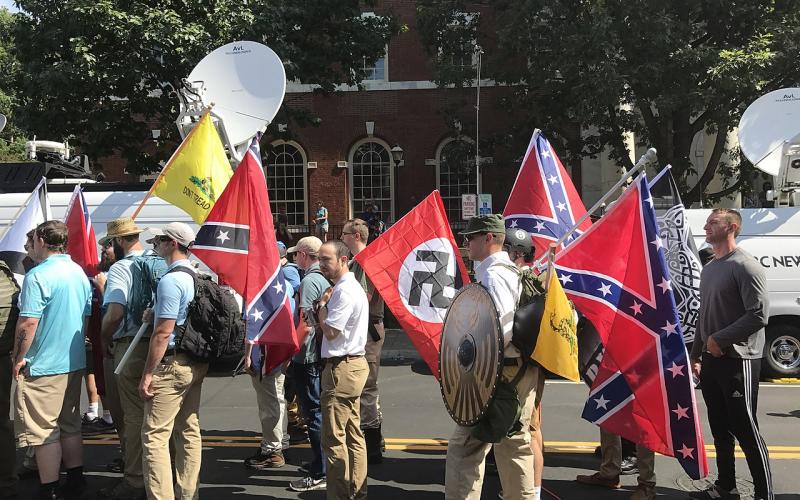The national turmoil we are witnessing [in the United States] is not just a crisis of institutions, or politics, or a society at a crossroads. It is also a crisis of health.
Hate, such as the kind we witnessed in Charlottesville, Virginia, is like a disease, spreading among populations, undermining health in a manner eerily similar to that of a pathogen. When a society is infected by hate, it is not hard to see how it can affect our bodies and minds.
Being hated is stressful. It makes a person fear for her safety, resent her lack of respect, and worry about what the future holds for herself and her family. People who feel hated are more likely to experience major depression,[i] and the fruits of hate — prejudice, discrimination, segregation, and interpersonal antagonism — sicken and kill Americans every day.
Consider racial segregation. Epidemiological research shows that segregation was linked[ii] to an estimated 176,000 deaths each year, and isolation segregation may contribute[iii] to higher rates of maternal mortality. Or take the experience of sexual minorities. LGBT youth living in Boston neighborhoods with higher levels of hate crimes involving assaults are significantly likelier[iv] to report thinking about suicide, or attempting it. They are also likelier to use marijuana.[v]
Hate can be triggered by events, and has been shown to hurt the people we scapegoat in the wake of catastrophe. Arab-Americans living in this country after the Sept. 11, 2001, terror attacks, for example, were likelier to report[vi] high levels of psychological stress, less happiness, and poorer health. Hate is even bad for the people doing the hating.
Yet hate, for all its menace, can be cured. The cure begins with acknowledging the problem. There are signs that America may be prepared to take this step.
"People who feel hated are more likely to experience major depression, and the fruits of hate — prejudice, discrimination, segregation — sicken and kill Americans every day."
The American College of Physicians has formally recognized the power of hate to undermine well-being. The college recently released a statement[vii] characterizing hate crimes as a public health issue. Dr. Jack Ende, the president of the group, said: “It is imperative that physicians, and all people, speak out against hate and hate crimes and against those who foster or perpetrate it.”[viii]
Meanwhile, the president of the United States continues to equivocate[ix] and suggest that the victims of hate crimes are as much to blame for the violence as the perpetrators. On this issue, Ende has shown to be the better leader. When health is threatened by hate, speaking out is as critical to well-being as vaccination in the face of plague. The widespread denunciation of President Donald Trump’s unwillingness to call out those who traffic in hate is an encouraging sign that our body politic still has an immune system, and that it is working to reject the infection that has seized us.
We must also come to grips with the causes of hate, just as we would the causes of disease. This means confronting our country’s fraught racial history. It is perhaps fitting that the recent violence in Charlottesville sprang from the desire of white supremacists to safeguard the legacy of Robert E. Lee, a man who did much to preserve the legacy of racism we now face.
Last Saturday, a small rally took place on Boston Common, billed as featuring speakers who espoused hate in Charlottesville.[x] As historical irony would have it, the rally’s few dozen participants met in the shadow of another Civil War icon, a memorial to Col. Robert Gould Shaw and the Massachusetts 54th Regiment. In 1863, the 54thbecame the first documented African-American regiment formed in the north, with Shaw as its leader. On July 18 of that year, more than 70 members of the regiment, including its commander, would perish in an attack on Fort Wagner in South Carolina.[xi] The Southern rebels buried the white Shaw in a mass grave with his men — an intended insult.[xii] Yet this act of hate would become an enduring symbol of the better America that Shaw and his fellow soldiers died to build.
Just as they inspired hope in their time, the estimated 40,000 counter-protesters[xiii] who filled Boston last weekend to demand an end to hate inspire hope in ours. In Michigan, there are further signs of hope. Despite a rise in hate groups[xiv] in the state in recent years, the local reaction to Charlottesville has been encouraging, with mayors joining with community leaders in a pledge to fight extremism.[xv]
This is not the first time in our history we have faced hate. Yet I continue to hope that each encounter further reinforces our capacity to resist and transcend this rancor, as Shaw and his men did, with the conviction that someday the fever really will break, that America will arrive at an honest reckoning with its legacy of hate and finally come into its own as a truly healthy nation.♦
About the Author
Dr Sandro Galea is a physician and an epidemiologist. He is the Robert A. Knox Professor and Dean at the Boston University School of Public Health. Prior to his appointment at Boston University, Dr Galea served as the Gelman Professor and Chair of the Department of Epidemiology at the Columbia University Mailman School of Public Health. He previously held academic and leadership positions at the University of Michigan and at the New York Academy of Medicine. In his scholarship, Dr Galea is centrally interested in the social production of health of urban populations, with a focus on the causes of brain disorders, particularly common mood-anxiety disorders and substance abuse. He has long had a particular interest in the consequences of mass trauma and conflict worldwide, including as a result of the September 11 attacks, Hurricane Katrina, conflicts in sub-Saharan Africa, and the American wars in Iraq and Afghanistan.
[i] Kessler, R., Mickelson, K. and D. Williams (1999) “The Prevalence, Distribution, and Mental Health Correlates of Perceived Discrimination in the United States.” Journal of Health and Social Behavior. Vol 40 (September): 208-230. Available at: https://goo.gl/NDzXim
[ii] Galea, S., Tracy, M., Hoggatt, K., DiMaggio, C. and A. Karpati (2011) “Estimated Deaths Attributable to Social Factors in the United States.” American Journal of Public Health. Vol 101(8): 1456-1465. Available at: https://goo.gl/E3YaZe
[iii] Kramer, M. and C. Hogue (2009) “Is Segregation Bad for Your Health?” Epidemiologic Reviews. Vol 31: 178-194. Available at: https://goo.gl/ZG7SJB
[iv] Duncan, D. and M. Hatzenbuehler (2014) “Lesbian, Gay, Bisexual, and Transgender Hate Crimes and Suicidality Among a Population-Based Sample of Sexual-Minority Adolescents in Boston.” American Journal of Public Health. Vol 104(2): 272-278. Available at: https://goo.gl/i4ucEZ
[v] Duncan, D., M. Hatzenbuehler and R. Johnson (2014) “Neighborhood-level LGBT hate crimes and current illicit drug use among sexual minority youth.” Drug and Alcohol Dependence. Vol 135: 65-70. Available at: https://goo.gl/ouYyYL
[vi] Padela, A. and M. Heisler (2010) “The Association of Perceived Abuse and Discrimination After September 11, 2001, With Psychological Distress, Level of Happiness, and Health Status Among Arab Americans.” American Journal of Public Health. Vol 100(2): 284-291. Available at: https://goo.gl/3oV5zm
[vii] American College of Physicians (ACP) (2017, July) “Position Statement on Recognizing Hate Crimes as a Public Health Issue.” Available at: https://goo.gl/UZMtrQ
[viii] ACP (2017) “American College of Physicians Says Hate Crimes are Public Health Issue.” ACP Newsroom, August 14, 2017. Available at: https://goo.gl/aA8uQq
[ix] Graham, D. (2017) “Why White Supremacists Find Comfort in Trump’s Erratic Messaging.” The Atlantic. Published August 15, 2017. Available at: https://goo.gl/tNYrHp
[x] Brown, S. and B. Gellerman (2017) “As Boston Prepares For Demonstrations, Here’s What We Know About ‘Free Speech’ Rally Organizers.” WBUR News. Published August 15, 2017. Available at: https://goo.gl/8MJT5p
[xi] NPS.gov (2015) “Robert Gould Shaw and the 54th Regiment.” National Park Service. Webpage Updated February 26, 2015. Date Accessed: August 30, 2017. Available at: https://goo.gl/5kddqv
[xii] Civilwar.org (2017) “Biography: Robert Gould Shaw.” Civil War Trust. Date Accessed: August 30, 2017. Available at: https://goo.gl/PMpbZE
[xiii] Zalkind, S. (2017) “Boston’s ‘Free Speech’ Rally Goes Bust vs. 40,000 Protesters.” Daily Beast. Published August 19, 2017. Available at: https://goo.gl/FAitwk
[xiv] Brush, M. and K. Lafond (2017) “Number of ‘hate groups’ found in Michigan increases in recent years, according to the SPLC.” Michigan Radio. Published on August 18, 2017. Available at: https://goo.gl/W6aeVt
[xv] Gibbons, L. (2017) “Five Michigan mayors join pledge to fight extremism in Charlottesville aftermath.” Michigan News. Published on August 21, 2017. Available at: https://goo.gl/vn9beQ
Versions of this article appeared in the Boston Globe and the Detroit News.
Image Credit: Anthony Crider (August 12, 2017), Charlottesville, “Unite the Right” Rally

